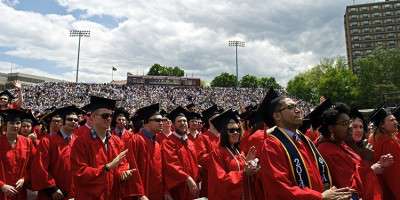
As a result of the Great Recession of 2008, the national six-year graduation completion rates for college students of the Fall 2008 cohort saw a slight decline from previous years, according to a Tuesday report by the National Student Clearinghouse.
The completion rate for the Fall 2008 group was 55 percent, a 1.1 percent decrease from the 2007 cohort, according to the report. Colleges and universities usually measure graduation rates in six-year increments for bachelor’s degrees to allow for changes in student schedules, such as taking a leave of absence and foreign exchange programs, among others.
“When the cohort for this study entered college, the prospect of a degree as a buffer against hard times was top of mind for many who found themselves newly unemployed,” report stated. “Yet, while the labor market lowered the opportunity cost of enrolling, rising college tuition continued to drive postsecondary degrees out of reach for many Americans.”
The completion rate for students at four-year private nonprofit institutions increased 0.7 percent, but their share of the total cohort for Fall 2008 was a decrease of 1.2 percent compared to Fall 2007, according to the report.
Afet Dundar, associate director of NSC, said the results highlight the need to have measures that capture the complexity of students’ postsecondary plans.
“If we know about the outcomes all students… public and institutional policies can be tailored to the needs of different populations of students acknowledging pathways that may involve enrolling in more one institution, enrolling part-time and entry into college at ages and life circumstances,” she said in an email.
The survey found that nontraditional students, those aged 20 to 24 upon entering college, saw that completion rates declined 2.6 percent, Dundar said.
“Only one-half of a percentage point was observed for traditional-aged students, but most of this was due to a small shift away from full-time enrollment,” she said. “[There was] no decline in the completion rate was observed for traditional age students, those age 20 or younger at first entry, who were enrolled exclusively full-time. “
Colin Riley, Boston University spokesman, said as a four-year institution with strong graduation rates, BU has remained fairly stable during the recession.
“It [the completion rate] is very stable,” he said. “It’s been trending up over the last 20 years and continues to be very strong. Of course the goal is to continue to increase that at a higher rate.”
Of the 4,163 students from the 2007 first-time, full-time bachelor’s degree-seeking undergraduates, 3,307 students completed the program in four years or less, according to the BU Common Data Set on Enrollment and Persistence.
“There’s very strong academic focus and emphasis on the quality of teaching and support to be aware of where students are and recognize those students and provide those opportunities to direct any academic needs,” he said. “There’s a very good counseling faculty [and] advising [who] are the ones close to the students and they’re able to identify those individuals who may be having a set back.”
The most recent cohort, 2013-14, has an 84 percent completion rate, Riley said.
Although many students currently in college were not enrolled in school during the recession, they said they still recognize the importance of completing a college education and still see the impacts of the recession.
David Laclé, a sophomore in the College of Arts and Sciences, said the decline in college completion might have adversely impacted the economy.
“[The recession] led to people not being able to afford college and then less people were qualified for jobs, and it just made the economy worse,” he said.
Nicholas Catalfamo, a freshman in the School of Hospitality Administration, said having a well-rounded education is important in finding a job after college.
“The fact that there are less job opportunities and there’s less of an opportunity cost, you’d really have to continue on to a further education to get the same job that you may not have needed the extra education for before the recession when the economy was good,” he said.
Jon Mirsky, a freshman in the College of Arts and Sciences, said college completion plays a necessary role in a student’s future to secure a job, regardless of the country’s economic status.
“Completing college exposes you to so many opportunities that you may have not even considered during college,” he said. “It’s important to maximize your opportunities because you never know how the status of the economy may impact your desired career path.”





















































































































